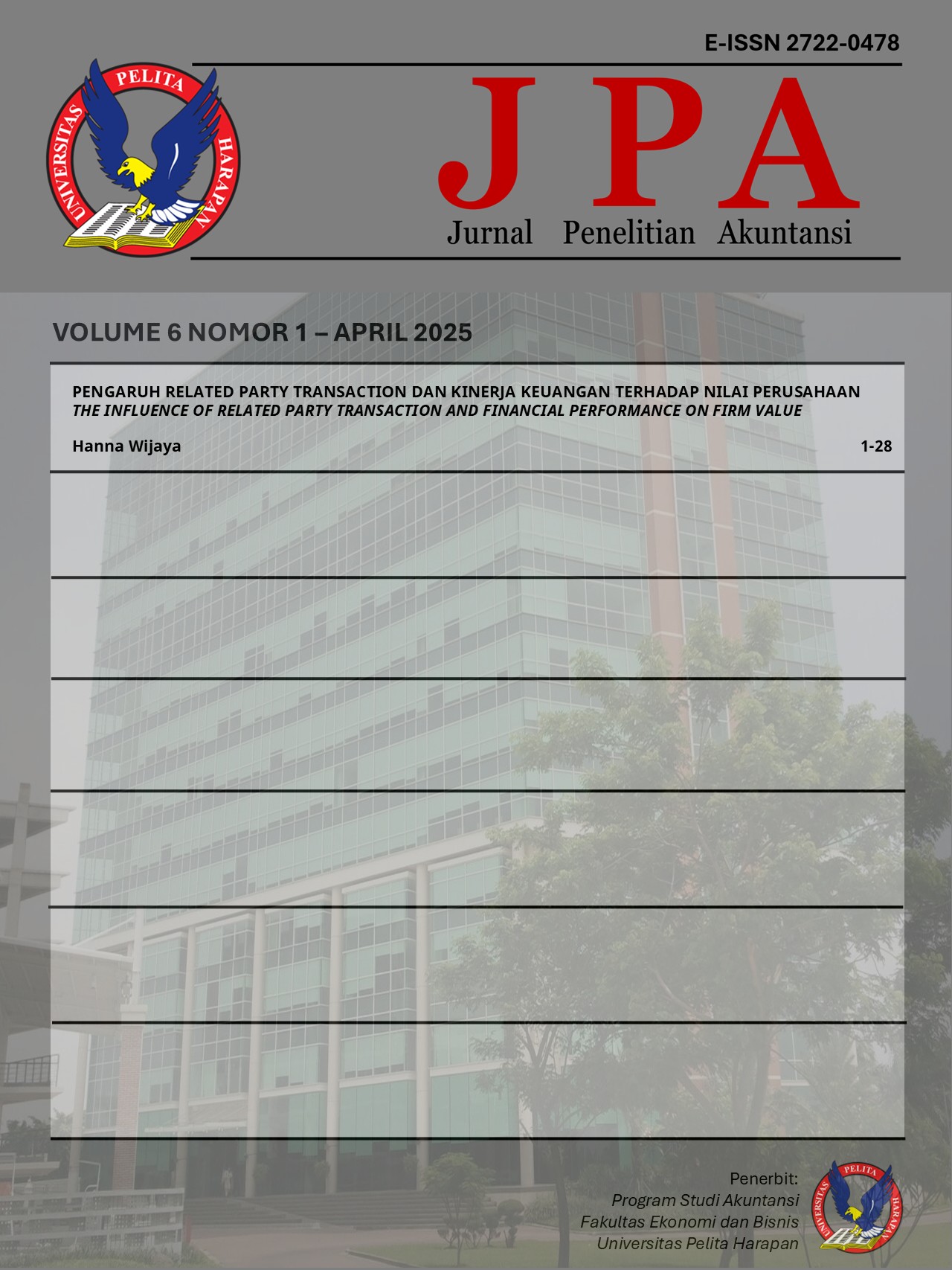PENGARUH PENGETAHUAN MENDETEKSI KEKELIRUAN, PENGALAMAN AUDITOR, PROFESIONALISME AUDITOR, DAN RISIKO AUDIT TERHADAP PENENTUAN TINGKAT MATERIALITAS
Abstract
The purpose of this study to analyze the influence of knowledge of error detection, auditors’ experience, professionalism, and audit risk on materiality-level considerations. This study uses primary data collected from questionannaire using google form as the tools to help collect data by broadcasting it through email and peers. The population of this study is auditors who works at accounting firms in the city of Jakarta and the sampling technique used for this study is purposive sampling, there are two requirment for the sample and it needs to meet both requirments, which is they are an auditor that works at accounting firms in the city of Jakarta and at one point make a judgement to set the materiality level on financial statement level or on account level. The type of data used in this study is quantitative with multiple linear reggresion to analyze the relation between variables. The results show that knowledge of error detection, auditors’ experience, professionalism, and audit risk simultaneously have a significant influence on materiality-level considerations. Knowledge of error detection, auditors’ experience, professionalism, and audit risk partially have a positive and significant influence on materiality-level considerations.
Literaturhinweise
Arens, A. A., Elder, R. J., Beasley, M. S., & Hogan, C. E. (2017). Auditing and Assurance Services. In Pearson Education Limited.
Christensen, B. E., Eilifsen, A., Glover, S. M., & Messier, W. F. (2020). The effect of audit materiality disclosures on investors’ decision making. Accounting, Organizations and Society, 87(xxxx), 101168. https://doi.org/10.1016/j.aos.2020.101168
Eksellen, G., & Fatimah, N. (2022). Pengaruh Pengalaman Auditor dan Profesionalisme Auditor Terhadap Kualitas Audit (Studi pada Kantor Akuntan Publik di Kota Bandung). הארץ, 16(8.5.2017), 2003–2005.
Firani, M. (2024). Pertimbangan Tingkat Materialitas Dalam Audit : Faktor yang Mempengaruhinya Consideration of Materiality Levels in Audits : Factors That Influence Them. 11, 77–95. https://doi.org/10.55963/jraa.v11i1.642
Homer, E. M. (2020). Testing the Fraud Triangle: A Systematic Review. Journal of Financial Crime, 27(1), 172–187. https://doi.org/10.1108/JFC-12-2018-0136
IAPI. (2021). Standar Audit 320 (Revisi 2021) Materialitas Dalam Tahap Perencanaan dan Pelaksanaan Audit. Standar Profesional Akuntan Publik, 200(Revisi), 1–69.
Joddi, F. D., & Edi, S. (2023). Pengaruh Profesionalisme Auditor dan Pengalaman Auditor terhadap Pertimbangan Materialitas. Bandung Conference Series: Accountancy, 3(2), 857–863. https://doi.org/10.29313/bcsa.v3i2.8498
Karina, A., Saad, B., & Putri, S. A. (2023). Pengaruh Independensi, Pengetahuan Auditor, dan Etika Profesi Terhadap Pertimbangan Tingkat Materialitas. Jurnal Ilmu Dan Budaya, 44(1), 26. https://doi.org/10.47313/jidb.v44i1.2055
Meisha, P. A., Ardilah, Z., Zahroh, A., & Nisa, E. S. (2023). Pengaruh Faktor Risiko Audit Terhadap Pengaturan Tingkat Materialitas Dalam Proses Audit. Jurnal Ilmu Sosial Dan Humaniora, 1(3), 164–171. http://jurnal.kolibi.org/index.php/kultura
Nainggolan, A., & Amalia, R. (2019). Pengaruh Profesionalisme Auditor, Pengetahuan Mendeteksi Kekeliruan, dan Tingkat Profesi Terhadap Pertimbangan Tingkat Materialitas Akuntan Publik. Jurnal Ilmiah Akuntansi Dan Ekonomi, Volume .4(2), 26–36.
Ni Putu Yuni Astari, N. P. R. dan I. B. M. P. M. (2020). Pengaruh Profesionalisme, Independensi, Pengetahuan Mendeteksi kekeliruan, Pengalaman dan Etika Profesi Auditor Terhadap Pertimbangan Tingkat Materialitas pada Kap di Wilayah bali. Jurnal Riset Akuntansi Warmadewa, 1(3), 6–11. https://doi.org/10.22225/
Nudyah, H. S. (2021). Pertimbangan Auditor Atas Tingkat Materialitas (Studi Kasus Kantor Akuntan Publik Provinsi Yogyakarta Dan Jateng). Journal of Accounting, Finance, Taxation and Auditing, 3(2), 189–204. https://journal.maranatha.edu/index.php/jafta/article/view/3929/2039
Ode, A. La, Wahyuniati, H., Angela, F., & Oktri, S. (2020). Auditor’s Ability To Detect Fraud: Independence, Audit Experience, Professional Skepticis, and Workload. Rjoas, 11(November), 192–205.
OJK. (2023). OJK Beri Sanksi Untuk AP dan KAP Terkait Wanaartha Life Di Tengah Penanganan Likuidasi.
Rachmawati, Y., & Sonny, M. K. G. (2023). Pengaruh Pengalaman Kerja dan Pengetahuan Mendeteksi Kekeliruan Terhadap Pertimbangan Tingkat Materialitas Dengan Etika Profesi Sebagai Variabel Moderasi. Pengaruh Pengalaman Kerja Dan Pengetahuan Mendeteksi Kekeliruan Terhadap Pertimbangan Tingkat Materialitas Dengan Etika Profesi Sebagai Variabel Moderasi, 1(2), 142–154.
Sangadah, L. (2022). Pengaruh Akuntabilitas Auditor, Independensi Auditor, Dan Profesionalisme Auditor Terhadap Kualitas Audit. Owner, 6(2), 1137–1143. https://doi.org/10.33395/owner.v6i2.636
Setiadi. (2019). Materialitas pada Proses Audit. Jurnal Bisnis Dan Akuntansi Unsurya, 4(2), 87–93.
Shinta, N. K. S., Rustiarini, N. W., & Dewi, N. P. S. (2022). Pengaruh Kompetensi, Profesionalisme, Independensi, Pengalaman Auditor, dan Tipe Kepribadian terhadap Pertimbangan Tingkat Materialitas. Jurnal Kharisma, 4(2), 1–12.
Sufiati, & Utama, M. F. P. (2021). Pengaruh Profesionalisme Dan Pengetahuan Auditor Dalam Mendeteksi Kekeliruan Terhadap Pertimbangan Tingkat Materialitas Pada Kantor Akuntan Publik Di Kota Makassar. Contemporary Journal on Business and Accounting, 1(1), 42–57. https://doi.org/10.58792/cjba.v1i1.6
Zulvia, D., & Tanmela, S. (2022). Determinasi Risiko Audit, Pengalaman Auditor dan Profesionalisme Terhadap Pertimbangan Tingkat Materialitas pada Kantor Akuntan Publik Di Kota Padang. Jurnal Pundi, 6(1), 19–32. https://doi.org/10.31575/jp.v6i1.388
Downloads
Veröffentlicht
Ausgabe
Rubrik
Lizenz
Copyright (c) 2025 Vinsen Revelin Susanto, Septian Bayu Kristanto

Dieses Werk steht unter der Lizenz Creative Commons Namensnennung - Weitergabe unter gleichen Bedingungen 4.0 International.
Authors who publish with this journal agree to the following terms:
1) Authors retain copyright and grant the journal right of first publication with the work simultaneously licensed under a Creative Commons Attribution License (CC-BY-SA 4.0) that allows others to share the work with an acknowledgement of the work's authorship and initial publication in this journal.
2) Authors are able to enter into separate, additional contractual arrangements for the non-exclusive distribution of the journal's published version of the work (e.g., post it to an institutional repository or publish it in a book), with an acknowledgement of its initial publication in this journal.
3) Authors are permitted and encouraged to post their work online (e.g., in institutional repositories or on their website). The final published PDF should be used and bibliographic details that credit the publication in this journal should be included.


